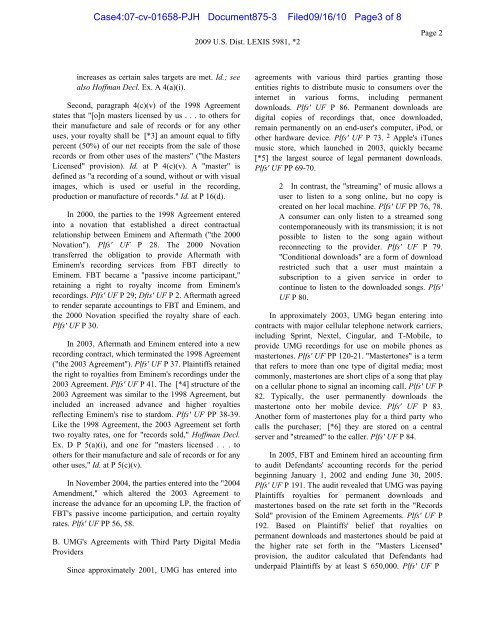exhibit 2 - SAP Lawsuit Portal
exhibit 2 - SAP Lawsuit Portal
exhibit 2 - SAP Lawsuit Portal
You also want an ePaper? Increase the reach of your titles
YUMPU automatically turns print PDFs into web optimized ePapers that Google loves.
Case4:07-cv-01658-PJH Document875-3 Filed09/16/10 Page3 of 8<br />
increases as certain sales targets are met. Id.; see<br />
also Hoffman Decl. Ex. A 4(a)(i).<br />
Second, paragraph 4(c)(v) of the 1998 Agreement<br />
states that "[o]n masters licensed by us . . . to others for<br />
their manufacture and sale of records or for any other<br />
uses, your royalty shall be [*3] an amount equal to fifty<br />
percent (50%) of our net receipts from the sale of those<br />
records or from other uses of the masters" ("the Masters<br />
Licensed" provision). Id. at P 4(c)(v). A "master" is<br />
defined as "a recording of a sound, without or with visual<br />
images, which is used or useful in the recording,<br />
production or manufacture of records." Id. at P 16(d).<br />
In 2000, the parties to the 1998 Agreement entered<br />
into a novation that established a direct contractual<br />
relationship between Eminem and Aftermath ("the 2000<br />
Novation"). Plfs' UF P 28. The 2000 Novation<br />
transferred the obligation to provide Aftermath with<br />
Eminem's recording services from FBT directly to<br />
Eminem. FBT became a "passive income participant,"<br />
retaining a right to royalty income from Eminem's<br />
recordings. Plfs' UF P 29; Dfts' UF P 2. Aftermath agreed<br />
to render separate accountings to FBT and Eminem, and<br />
the 2000 Novation specified the royalty share of each.<br />
Plfs' UF P 30.<br />
In 2003, Aftermath and Eminem entered into a new<br />
recording contract, which terminated the 1998 Agreement<br />
("the 2003 Agreement"). Plfs' UF P 37. Plaintiffs retained<br />
the right to royalties from Eminem's recordings under the<br />
2003 Agreement. Plfs' UF P 41. The [*4] structure of the<br />
2003 Agreement was similar to the 1998 Agreement, but<br />
included an increased advance and higher royalties<br />
reflecting Eminem's rise to stardom. Plfs' UF PP 38-39.<br />
Like the 1998 Agreement, the 2003 Agreement set forth<br />
two royalty rates, one for "records sold," Hoffman Decl.<br />
Ex. D P 5(a)(i), and one for "masters licensed . . . to<br />
others for their manufacture and sale of records or for any<br />
other uses," Id. at P 5(c)(v).<br />
In November 2004, the parties entered into the "2004<br />
Amendment," which altered the 2003 Agreement to<br />
increase the advance for an upcoming LP, the fraction of<br />
FBT's passive income participation, and certain royalty<br />
rates. Plfs' UF PP 56, 58.<br />
B. UMG's Agreements with Third Party Digital Media<br />
Providers<br />
Since approximately 2001, UMG has entered into<br />
2009 U.S. Dist. LEXIS 5981, *2<br />
Page 2<br />
agreements with various third parties granting those<br />
entities rights to distribute music to consumers over the<br />
internet in various forms, including permanent<br />
downloads. Plfs' UF P 86. Permanent downloads are<br />
digital copies of recordings that, once downloaded,<br />
remain permanently on an end-user's computer, iPod, or<br />
other hardware device. Plfs' UF P 73. 2 Apple's iTunes<br />
music store, which launched in 2003, quickly became<br />
[*5] the largest source of legal permanent downloads.<br />
Plfs' UF PP 69-70.<br />
2 In contrast, the "streaming" of music allows a<br />
user to listen to a song online, but no copy is<br />
created on her local machine. Plfs' UF PP 76, 78.<br />
A consumer can only listen to a streamed song<br />
contemporaneously with its transmission; it is not<br />
possible to listen to the song again without<br />
reconnecting to the provider. Plfs' UF P 79.<br />
"Conditional downloads" are a form of download<br />
restricted such that a user must maintain a<br />
subscription to a given service in order to<br />
continue to listen to the downloaded songs. Plfs'<br />
UF P 80.<br />
In approximately 2003, UMG began entering into<br />
contracts with major cellular telephone network carriers,<br />
including Sprint, Nextel, Cingular, and T-Mobile, to<br />
provide UMG recordings for use on mobile phones as<br />
mastertones. Plfs' UF PP 120-21. "Mastertones" is a term<br />
that refers to more than one type of digital media; most<br />
commonly, mastertones are short clips of a song that play<br />
on a cellular phone to signal an incoming call. Plfs' UF P<br />
82. Typically, the user permanently downloads the<br />
mastertone onto her mobile device. Plfs' UF P 83.<br />
Another form of mastertones play for a third party who<br />
calls the purchaser; [*6] they are stored on a central<br />
server and "streamed" to the caller. Plfs' UF P 84.<br />
In 2005, FBT and Eminem hired an accounting firm<br />
to audit Defendants' accounting records for the period<br />
beginning January 1, 2002 and ending June 30, 2005.<br />
Plfs' UF P 191. The audit revealed that UMG was paying<br />
Plaintiffs royalties for permanent downloads and<br />
mastertones based on the rate set forth in the "Records<br />
Sold" provision of the Eminem Agreements. Plfs' UF P<br />
192. Based on Plaintiffs' belief that royalties on<br />
permanent downloads and mastertones should be paid at<br />
the higher rate set forth in the "Masters Licensed"<br />
provision, the auditor calculated that Defendants had<br />
underpaid Plaintiffs by at least $ 650,000. Plfs' UF P


